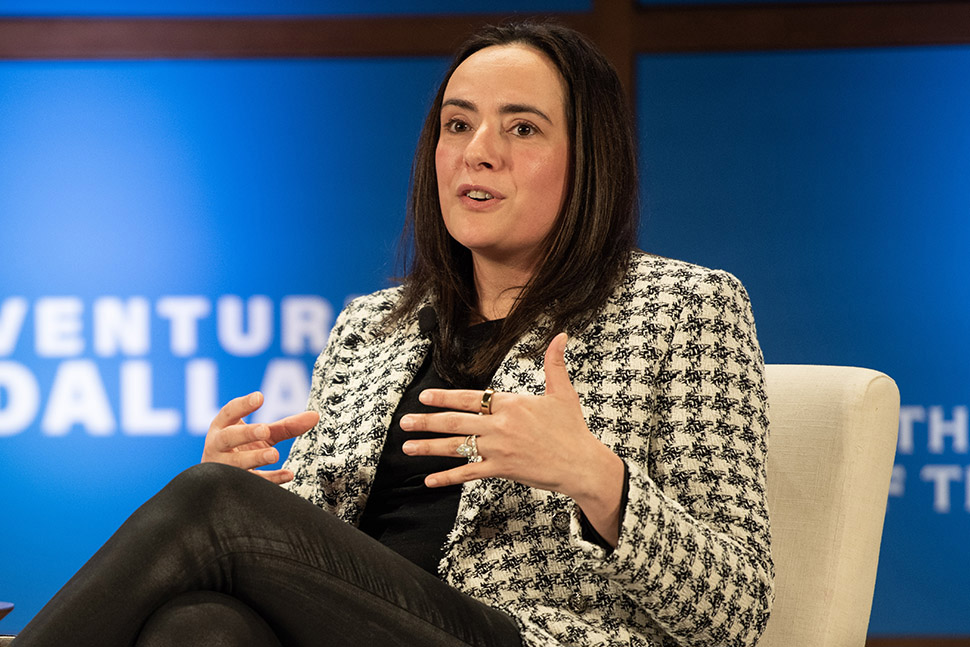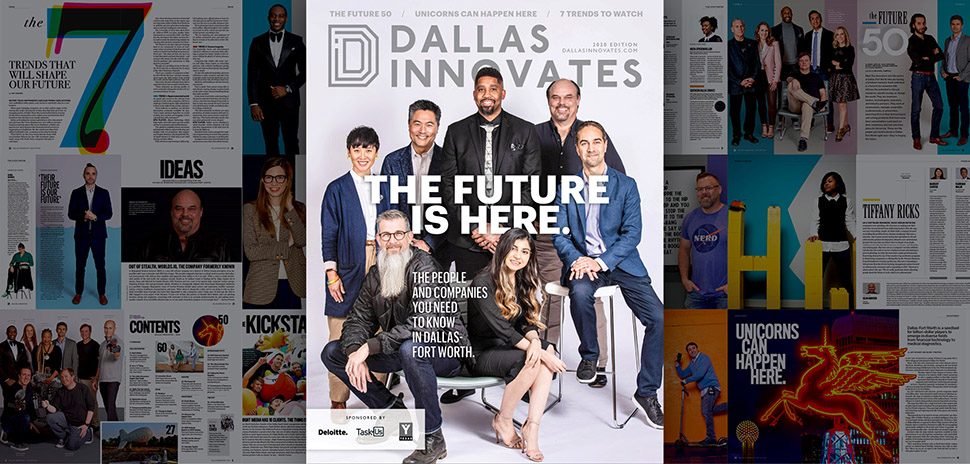Kicking off the Venture Dallas conference last week, innovator and investor Ross Perot Jr. set the tone in a fireside chat at a VIP reception, noting the region’s growth as a hub for entrepreneurship and the people that make up the local ecosystem.
“We have the natural resources, we have the people, we have a work ethic, we just have to continue to work hard,” Perot said during the VIP event. “Regions like Texas and Dallas-Fort Worth, we’re the model for the rest of the nation on how to get things done. We have an extraordinarily bright future. You look at the people in the room—the ideas, the energy, the generation of what you’re going to do—it’s going to be very impressive and very exciting.”
The following day—amid keynotes and panels featuring some of the region’s top minds at the George W. Bush Presidential Center—Venture Dallas’ had its return to in-person programming since its 2019 launch.
Venture Dallas draws local, national attention
Nearly 300 were in attendance at the conference, which brings together investors, startups, and business leaders to showcase North Texas’ entrepreneurial and venture ecosystem. And even before the main events started, more than 250 connections between those leaders were made. Reflecting the growing interest in the region, 25% of those in attendance came from outside of DFW and 18% came from out of state. Among them were investors from angels to growth-stage VCs to private equity, along with entrepreneurs whose businesses ranged from pre-revenue to those making millions of dollars annually.
“Venture Dallas is important for a variety of reasons,” Aaron Pierce, Venture Dallas co-founder and partner at Perot Jain, told Dallas Innovates. “It provides a platform for investors and entrepreneurs to engage and provides opportunities for meaningful connections that last long beyond the conclusion of the conference. Venture Dallas is organizing the sprawling DFW tech ecosystem in a way that outside investors and funds across the nation are beginning to take notice and understand why they should be spending time in Dallas-Fort Worth.”

Aaron Pierce [Photo: Michael Samples/Dallas Innovates]
The ‘premier venture capital conference in North Texas’
Pierce calls Venture Dallas the “premier venture capital conference in North Texas.” This year’s event “well-exceeded expectations,” he said.
A nonprofit enterprise, Venture Dallas was created by North Texas dealmakers including current steering committee members Capital Factory’s Brian Chambers, Cypress Growth Capital’s Vik Thapar, the Dallas Regional Chamber’s Duane Dankesreiter, Intelis Capital’s Jonathan Crowder, Perot Jain’s Aaron Pierce, and Silicon Valley Bank’s Samantha Colletti.
Since its inception in 2019, Venture Dallas has brought together investors from all over the U.S—from VCs to family offices and angels—with the “best founders in our region” to foster “collisions” and “meaningful connections.” Pierce added that those will hopefully lead to potential fundings—and successful exits.

The 2022 Venture Dallas steering committee on stage at the Bush Center with Arlan Hamilton and Mark Cuban. [Photo: Joseph Haubert/Venture Dallas]
“Dallas has a strong entrepreneurial community and events like this show the strength, reach, and impact of it,” Annabel Reeves, Venture Dallas chief of staff and associate at Goldman Sachs, told Dallas Innovates. “The networking rooms were constantly buzzing. I heard many people speak about the amazing connections they were making everywhere they turned. For me personally, I’ve never been in a room with so many familiar faces in Dallas—let alone all of whom are so passionate about supporting entrepreneurs and finding ways to provide value to others on their journey.”
If you missed out on Venture Dallas, check out some of the highlights below. And be sure to check back later this week as Dallas Innovates dives deeper into the insights from the individual panels and talks.
10 takeaways from Venture Dallas
Conversation with Steve Winn, former CEO of RealPage

Steve Winn [Photo: Michael Samples/Dallas Innovates]
“I knew we were going to transition [RealPage’s software] from a client server to an on-demand platform. I knew that was the end game. So, getting market share was key. We became the largest software provider, and we successfully transitioned to what’s now called SaaS with one instance of the code. And that gave us an immense competitive advantage over all the other players for a pretty significant period of time… We literally built seven businesses that I believe are each worth close to a billion dollars now around property management.” —Steve Winn
Conversation with Hana Khouri, CEO of Drive Shack

Hana Khouri [Photo: Michael Samples/Dallas Innovates]
“Puttery has evolved into what we have today—and it’s still evolving from lessons learned from each of the locations that are opening. Puttery was born off of—literally—a blank sheet of paper. We didn’t invent mini golf, but we really wanted to make it cool again and to bring it back into modern times. I think everyone has a sense of nostalgia when you think about mini golf. They probably don’t think about Puttery when they think of mini golf but, hopefully, they start to do that now with what we’ve built. We really paid attention to the vibe. Puttery is meant to be an immersive experience, featuring mini golf brought into the modern times.” —Hana Khouri
Conversation with John Olajide, CEO of Axxess

John Olajide, president and CEO of Axxess [Photo: Michael Samples/Dallas Innovates]
“Technology has shaped the evolution of healthcare in ways we don’t even realize. My purpose in life is to serve others. I get up every day, thinking about how I can leverage my platform, my talent, my resources—all that I am—to make the world a better place. I’ve been blessed to have worked with incredible people that have helped move that forward. And now, I’m doing that around the world. I’m investing actively all over the world. Really, the goal is everywhere I show up or everywhere Axxess shows up, we leave the place better than when we met it.” —John Olajide
Current state of Web3 & crypto

Christopher Calicott [Photo: Michael Samples/Dallas Innovates]
“Now’s the time that [the industry] is actually starting and accelerating. It’s great here in Dallas, and in Texas more broadly, because of our natural energy, resources, energy-producing assets, and the way that the network is secured. The Bitcoin story is, in many ways—from its beginnings, and currently, and into the future—is also a Texas story. I’m excited about Texas. Things feel differently now, from the cycles that we’ve seen in these markets. I’m not hearing the 2018 stories of, ‘Well, pack it up boys, it’s over.’ People are actually investing. Right now…the capital is being formed; capital is being deployed; and founders are thinking about where they’re going to build and the platform based around it. So, there’re a lot of reasons to be excited.” —Christopher Calicott, managing director at Trammell Venture Partners
Investor perspectives

Sabrina Chaudhury [Photo: Michael Samples/Dallas Innovates]
“Advice for founders: Prepare today and bolster your defenses for what may come tomorrow. Run your business in a way that ensures that you’ll be in a strong cash position… Make the cuts today that you need to in order to not be on your back foot when you go back out to the markets. Also, choose your investors wisely. When things don’t go as planned—which they never really do—you want to be in bed with someone who’s going to help you get to where you need to be. That alignment is really important.” —Sabrina Chaudhury, VP at Kayne Partners
The Alto Story

Will Coleman [Photo: Michael Samples/Dallas Innovates]
“While I was at McKinsey, I started to develop a pretty contrarian point of view on Uber and Lyft and the marketplace model that surrounded the rise of personal mobility, and the disruption that was happening in the space. … I understood the stakes really well and felt passionate about it. So, I decided to do something about it. I saw an opportunity to de-commoditize mobility—to create a product that customers were willing to pay a bit more for and wait a bit longer for, which are ultimately underlying the biggest problems with the elusive profitability in the space. I thought I had an interesting way to do it—one that was non-obvious—to take everything they were saying and do the opposite: Have employees, not independent contractors; and have a fleet of vehicles, not somebody’s personal vehicle. And I was convinced when enough people told me, ‘No,’ that it was definitely a good idea if I was the only one that thought so.” —Will Coleman, founder and CEO of Alto
Building Veryable

Mike Kinder [Photo: Michael Samples/Dallas Innovates]
“Personally, I don’t like to fundraise. I see it as a necessary aspect of the business, and I do it to the extent that I do it right but I don’t enjoy it. I like building good companies. Early on, a lot of our funding was our money and family money, and we did exactly what we wanted to do—and that was to prove that our idea was going to work. After that, we were able to find a set of very, very good angels that could help us get to the next level. We had a term from the very beginning: It was called “tight core product.” So, we were going to build a very tight core product—make sure that we isolated the variables, and make sure we knew that what we had was going to work. We didn’t want to pollute that early on, we wanted to build on top of it.” —Mike Kinder, co-founder and CEO of Veryable
Family offices in venture

Sam Weatherford [Photo: Michael Samples/Dallas Innovates]
“We do need to see more families stepping up and being more engaged in venture. Especially if you’re scared of venture, you might be more scared now than you ever were when you see this market turnover. But as a smart investor you can recognize now is actually the best time to be allocating capital to venture. This is going to be the best time in the next 15, maybe 20 years, to be deploying capital. So, the answer is almost always more for virtually all the families that I know. The way you do it really matters. I think if your family has a very specific core competency, whether it’s real estate or a particular operating business, there’s an opportunity to understand that and figure out where technology is playing a role in that industry, where the trend line is going, and riding that wave. It may be a past industry that you were involved in, and you really have a strong thesis in regard to where that’s going. You want to build out a team in-house to go after that thesis, because you have a really strong conviction of where that industry is headed—should be headed—and you’d like to be in the lead. If you don’t have a core competency, if you don’t have a strong investment thesis but you want to be more allocated to venture, I do think fund-of-funds is a very good place to start. You’ve got to know yourself, understand exactly what you think the world should be. And then figure out where you want your pieces to be on the board.” —Sam Weatherford, partner at Weatherford Capital
Conversation with Troy Aikman

Troy Aikman [Photo: Michael Samples/Dallas Innovates]
“I learned at a very young age—especially when you start dealing with professional athletes when everybody’s getting paid—how do you motivate, how do you keep people focused? So, my approach to everything that I’ve ever done in my life—and it’s old school, and it sounds very simple—I’ve just always believed that there are no shortcuts. I didn’t feel like I was the best athlete growing up, I felt like I had to work harder than everybody. That’s been my approach in broadcasting, that’s been my approach in business. My biggest takeaway from what I’ve learned in business is that there are a lot of great ideas, and there are a lot of great concepts. But that alone won’t get you anywhere. It really comes down to people. Because I’ve been involved in some businesses and some technology that were game-changing, but we didn’t have the people who could execute the business.” —Troy Aikman
Conversation with Mark Cuban

Mark Cuban [Photo: Michael Samples/Dallas Innovates]
“There are a lot of business parallels and knowledge in coaching and running a team. When you first start a season, you have to determine what combination of players work the best. You can’t just say, ‘Okay, this is what they did last year,’ because players get older, they get wiser, they get better, they improve the skill set. It’s still a team game, you have to see how everybody plays together… There are different types of entrepreneurs. I almost always have to partner with somebody. I’m very much ready, fire, aim. And I need a lot of ready, aim, fire people who are perfectionists to keep me in line, so I don’t screw everything up.” —Mark Cuban
2022 Venture Dallas Steering Committee
“Venture Dallas is a 501c6 non-profit, volunteer-led organization dedicated to growing the innovation ecosystem in Dallas-Fort Worth,” the organization says on its website. “Committee and board members are dedicated to leveraging their deep ties to the venture and tech community to Venture Dallas activities.” Joining past steering committee members, including Beard, Revol, and Silicon Valley Bank’s Weston Betts, this year’s members include:
- Marisa Bertha, senior VP of strategy at Liquid Death
- Bryan Chambers, president and co-founder at Capital Factory and Venture Dallas co-founder
- Samantha Colletti, managing director at Silicon Valley Bank and Venture Dallas co-founder
- Jonathan Crowder, partner at Intelis Capital and Venture Dallas co-founder
- Duane Dankesreiter, senior VP at the Dallas Regional Chamber and Venture Dallas co-founder
- David Evans, managing partner at Sentiero Ventures
- JR Garcia, principal at Green Park & Golf Ventures
- Shale Gulbas, principal at Guideboat Capital Partners
- Inobat Karras, principal at Interlock Partners
- Chase Murphy, partner at Baker Tilly
- Aaron Pierce, venture partner at Perot Jain and Venture Dallas co-founder and board chair
- John Simon, business development at Mark Cuban Companies
- Annabel Reeves, associate at Goldman Sachs and Venture Dallas chief of staff
- Vik Thapar, managing director at Cypress Growth Capital and Venture Dallas co-founder
- Benjamin Vann, founder and CEO at Impact Ventures
- Blake Wiley, co-founder at Access Capital
Learn more about Venture Dallas here.
Dallas Innovates is a media partner of Venture Dallas.
![]()
Get on the list.
Dallas Innovates, every day.
Sign up to keep your eye on what’s new and next in Dallas-Fort Worth, every day.
Credit: Source link







Comments are closed.